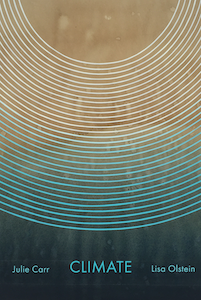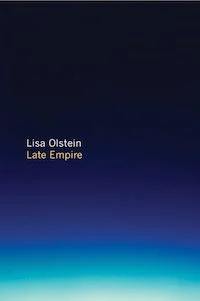Dream Apartment
An eerie, challenging collection. ―The Washington Post Book Club
The poems in Olstein’s latest collection are not dreamlike so much as they resemble the process of dreaming. They observe the way one part of a dream segues to another and the way a dream applies to and differs from daily life... work[ing] their magic through just such a sequential movement. ―Library Journal
A formal restlessness echoes the particularities of this mind at work... Sonic riffs propel the collection: vessel morphs into vassal, plum meets plumb as sound shapes the mind’s momentum. Wit, word play, and tonal shifts abound. ―Poetry Foundation
Dream Apartment is a deeply associative and language-forward collection. Olstein exemplifies what it looks like for a poet to play, even when play is in the presence of tragedy and grief, or when play is the serious kind that teaches us something essential.―The Rumpus
W.B. Yeats wrote that “we make out of the quarrels with others, rhetoric, but of the quarrel with ourselves, poetry.” In Dream Apartment, her 2023 book of poetry from Copper Canyon Press, Lisa Olstein does exactly this...The poet creates her personal lyric mode, one that uses a combination of disjunction and snappy aphorism to create a portrait of ‘her’ mind. We are offered intimacy, yet one distilled through her ever self-seeking, ever self-evading restlessness.―Merion West
Through brilliant enjambment, agile movement, textural acoustics, and rhythmic mastery, Olstein delivers a skilled yet deeply felt portrait of existential and ecological extinction, making the book an important marker of a shift from “weird” to “worldly,” from “ludic” to “lucid.” ―Preposition
...Each shape and pattern attends uniquely to the music of each line, offering a precise and dreamy effect through her examinations, and even negotiations, on how one lives or might live in the world. ―Rob McLennan's Blog
CLIMATE
This book turns like a jewel, exposing the facets of a friendship—as shared grief, as resistance, as the process of “wandering, through our microclimates, those we share and those we don’t but want to or could, to make for you a space of possibility and hope, even happiness, in the midst of your grief.” Yes. Me too. And the closing before the signature of each letter is a word that Carr and Olstein renegotiate and revive each time it is written: Love. ―Diane Seuss
In Julie Carr and Lisa Olstein’s tender, meticulous correspondence, the boundaries between letter, poem, essay, between reader, writer, friend, blur, as one question comes into focus: how are we to live our lives? Climate, like climate, takes you unawares, until you realize: you are the one that's being asked to answer. ―Barbara Browning
I fell in love with this book, in the way an intimate correspondence becomes something so much bigger than the individual voices who reach across space to speak and listen to one another. Olstein and Carr are each other’s ideal listeners, and we are fortunate to eavesdrop on their lives and hearts as they navigate the devastation so clearly laid out before all of us. ―Samuel Ace
PAIN STUDIES
WINNER OF THE WRITERS LEAGUE OF TEXAS NONFICTION DISCOVERY PRIZE
A MAYOR’S BOOK CLUB SELECTION
FINALIST FOR THE BIG OTHER NONFICTION BOOK AWARD
Olstein succeeds marvelously when directly reflecting on her own pain and her attempts to treat it. An accomplished poet, she often uses language beautifully and inventively. ―The New York Times
[Olstein] drops the heavy mantles of pain writing and dips, like a swimmer, into the ways that pain infiltrates and orients a bodymind, into the ways that it arranges a life. ―LA Review of Books
Rich, absorbing, and suggestive. ―Book Riot
Luminous....truly a dazzling addition to the literature on pain. ―Adroit Journal
Late Empire
This timely yet elemental collection from Olstein (Little Stranger) unfolds where the exigencies and distractions of daily life brush up against the political, the ethical, and the existential... Olstein’s profound and attentive poems reveal her formal dexterity and knack for spotting modernity’s absurdities. ―Publishers Weekly
Brilliant and provocative... Olstein realizes that the rules of language must be questioned, interrogated, and revised from within. ―The Literary Review
Olstein here meditates on a world gone awry, limning in precise, beautifully modulated language both personal dislocation and the slings and arrows visited upon the community at large. ―Library Journal
Little Stranger
Beautifully crafted and unsettling in just the right way, these poems track a poet of growing importance. ―Library Journal
Taut, sonically driven and darkly funny. ―The Volta
Is she just smarter about syntax, more articulate about human drama, more imaginative about eeriness, more insightful about sadness, more capable of turning a novel phrase, more engaging a storyteller than nearly all the rest of her peers? Well, yes. ―Huffington Post
Lost Alphabet
Olstein’s beautiful and ambitious collection unfolds just as it should, telling us a story without sounding like a storybook. ―Library Journal Best of 2009 selection
Lisa Olstein’s second collection of poems, Lost Alphabet, is a fascinating and inventive exploration of observation. ―American Poet
Most appealing is Olstein’s sensitive, quietly pained and earnest tone, which, more than the unusual subject, is the real star of this book. ―Publisher’s Weekly Starred Review
Radio Crackling, Radio Gone
This poet brings a sparkling consciousness to the page and an exciting new voice to American poetry. ―Library Journal
Olstein’s first book weaves its reader into a sensual and fibrous dreamscape inhabited by totem animals, somnambulist lovers hypnotic with longing, and symbols boldly acknowledged for their inherent duplicity. ―Ploughshares
Each poem stands on its own, total and whole: an intricate, delicate little world. ―Coldfront Magazine






